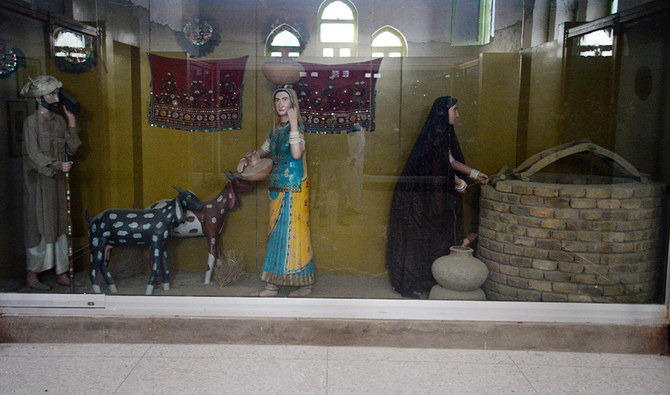UMERKOT, Sindh: Caged in a painting inside the museum, Marvi, a beautiful woman from Tharparkar who resisted the king’s marriage proposal, was imprisoned by the ruler of Sumra dynasty in the Umerkot fort in Pakistan’s Sindh province that is currently undergoing restoration work after years of neglect.

The authorities in Sindh decided to restore this historic fort as part of the government’s initiative to promote tourism in the southern Sindh province. Picture taken on November 27, 2019. (AN Photo by S.A. Babar)
Situated inside the Umerkot city, there are conflicting claims about the history of this 11th-century citadel, much like the different accounts of the city’s name which is also known as Amarkot.
According to one account, supported by the local Rana family, the city and the fort were constructed by Maharaja Amar Singh.

The British established a prison inside the fort that lies in ruins now. “The restoration team will rebuild the British-era prison without touching the old structure beneath it,” curator Ghulam Hussain Burdi told Arab news on November 27, 2019. (AN Photo by S.A. Babar)
Arbab Naik Muhammad, a local scholar of history, however, says that Singh’s family had come to power toward the end of the 13th century after the Sumra dynasty had ruled the place. Therefore, in his opinion, the city and the fort were constructed by King Umar Soomro.

Bricks are kept outside the main gate of Umerkot fort where restoration work began in December 2016 after years of neglect. Picture taken on November 27, 2019. (AN Photo by S.A. Babar)
“The town was founded by Umar, the first king of Sumra dynasty that ruled between 1050 and 1350. In the latter half of the 13th century, it was occupied by Parmar Sodha, a Rajput ruler. The fort was later surrendered to the Kalhora dynasty. However, its members sold the place to the Raja of Jodhpur. The Talpurs regained the fort in 1813 and held it until the British occupied Sindh in 1843,” an information board sharing the history of the fort reads.

The Mughal-era arms are displayed in the museum of the fort. Picture taken on November 27, 2019. (AN Photo by S.A. Babar)
Irrespective of who built the fort, people usually recall the story of Marvi while visiting the museum at the fort.
Home to ancient manuscripts, coins, paintings, specimens of calligraphy, royal documents, jewelry of Tharparkar, photographs of monuments and recently discovered Jain and Hindu sculptures that throw light on the Mughal period in general and Akbar’s reign in particular, the museum has images in which Marvi is pitching water from a well.

A board inside the fort says the restoration, conservation and preservation of the place began in December 2016. Picture taken on November 27, 2019. (AN Photo by S.A. Babar)
“Marvi was pitching water with other women when someone saw her and informed King Umar. She refused to marry the king and finally returned to her home untouched,” Ghulam Hussain Burdi, the fort’s curator, said.
Marvi is also one of the seven heroines of Shah Abdul Latif Bhittai, a mystic, saint, and poet, who preserved her memory in his verse.

The authorities in Sindh decided to restore this historic fort as part of the government’s initiative to promote tourism in the southern Sindh province. Picture taken on November 27, 2019. (AN Photo by S.A. Babar)
“O Umar, You have forcibly kept me in your captivity. Longing and craving for my dear country and people, if I die here in your palace, let not my dead body remain in prison.”

















